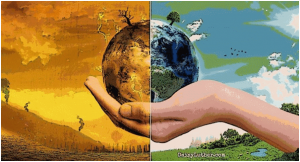
The state recognizes the peoples’ right to a balanced and healthful ecology in accord with the rhythm and harmony of nature (Article II Section 16 of the 1987 Constitution). Inline with this state policy, the Supreme Court in the landmark case of ‘Obosa vs. Factoran’, declared that it is our “inter-generational responsibility” and “correlative duty” to refrain from impairing the environment.
Every person has the right to live, to health, to food, to water, and housing. However, in what ways are these rights currently being violated? There have been so many studies that would suggest that such rights are violated through climate change.
“Ang init!”, “Taon-taon na lang, painit nang painit.”, “Pabago bago ng panahon.”, “Palakas nang palakas ang mga bagyo!” are some of the statements that we usually here nowadays. These are not only statements but a reality that we experience every single day, week, month, year that passes by. This is what we call “Climate Change.”
To start, climate change impact is a moral issue above all. It still remains the biggest moral challenge facing human kind, and for lying countries, climate change is about our survival into the future.
Climate change affects many human rights, undercutting the rights to health, to food, to water, and even housing (Article 25, Section 1 of Universal Declaration of Human Right). The impact of climate change affects everyone, especially the poorest people in the poorest countries, us and our children and our children’s children and so on. Hence, climate change threatens our survival.
A study conducted by the University of Hawaii’s Department of Geography, presents a concrete time frame when temperatures will reach unprecedented levels called “climate departure. It was stated by one of the authors of the said study that “the coldest year in the future will be hotter than the hottest year in the past.”
In the Philippines, climate change has been felt through the change in the “strength” of typhoons to hit the same since 1974. Among the deadliest typhoons are Haiyan, Thelma, Ike, Fengshen, Washi, Durian, Bopha, Trix, Amy and Nina. What is alarming is that five of ten have occurred since 2006, affecting and displacing thousands of citizens every time. Seven of these ten deadly storms each resulted in more than 1,000 casualties. But the deadliest record in the Philippines is Typhoon Haiyan, known locally as Typhoon Yolanda, which was responsible for more than 6,300 lost lives, over four million displaced citizens and $2 billion in damages in 2013.
So, who are responsible for the violations of human rights in the preceding paragraph?
In a very comprehensive research made by Dr. Heede, of the Accountability Institute of the US in 2013, it was found out that climate change has been primarily brought about by the carbon dioxide and methane emitted and accumulated into the atmosphere between 1751 and 2010 and can be attributed to just 90 entities or what are called as the “Carbon Majors” . In a long line of researches, it has already been settled that the carbon dioxide emitted into the atmosphere created the greenhouse effect which causes the climate change.
As explained above, human rights cannot only be affected through direct participation by person or persons, but also by indirect actions as in the case of the carbon majors which are causing the emissions of carbon dioxide into the atmosphere, leading to climate change which now affects certain basic human rights such as the right to live, to health, to food, to water, and even housing as enunciated in Article II Section 15 of the Constitution and in Article 25, Section 1 of Universal Declaration of Human Rights.